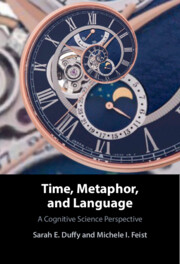
-
Select format
-
- Publisher:
- Cambridge University Press
- Publication date:
- November 2023
- November 2023
- ISBN:
- 9781108150101
- 9781107194038
- 9781316645284
- Dimensions:
- (228 x 152 mm)
- Weight & Pages:
- 0.46kg, 202 Pages
- Dimensions:
- (229 x 152 mm)
- Weight & Pages:
- 00kg, 202 Pages
You may already have access via personal or institutional login
Book description
Across languages, time tends to be understood in terms of space. For instance, we might think of time as an unstoppable train heading towards us when we hear 'holidays are coming', or we might imagine time as a landscape that we move across as we 'approach the moment of truth'. In this pioneering book, Duffy and Feist bring together research from across disciplines to provide a more nuanced understanding of what metaphor is and how it underpins our conceptualizations of time. Illustrated with a wide range of authentic examples from natural language, the book offers a holistic understanding of metaphors for time, encompassing the varied ways in which people draw on spatial experiences, as well as the broader variety of 'human experience' on an individual level. In doing so, it highlights the importance of variation across cultures, across contexts, and across individuals for metaphoric conceptualization.
Contents
Metrics
Altmetric attention score
Full text views
Full text views help Loading metrics...
Loading metrics...
* Views captured on Cambridge Core between #date#. This data will be updated every 24 hours.
Usage data cannot currently be displayed.
Accessibility standard: Unknown
Why this information is here
This section outlines the accessibility features of this content - including support for screen readers, full keyboard navigation and high-contrast display options. This may not be relevant for you.
Accessibility Information
Accessibility compliance for the PDF of this book is currently unknown and may be updated in the future.


